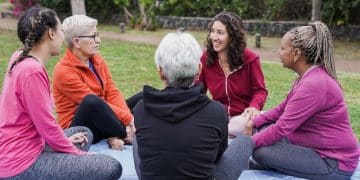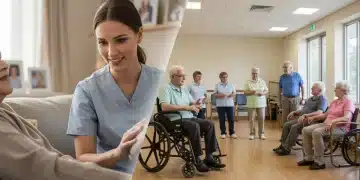Government Programs for Seniors: Your 2025 Guide to Housing, Healthcare, and Financial Aid

Government Programs for Seniors: Housing, Healthcare, and Financial Assistance Options in 2025 offer vital support to older adults, providing access to affordable housing, comprehensive healthcare, and financial aid to ensure their well-being and independence.
Navigating the landscape of available resources can be challenging as a senior. That’s why understanding the myriad Government Programs for Seniors: Housing, Healthcare, and Financial Assistance Options in 2025 is essential. This guide clarifies key opportunities to secure your future and well-being.
Understanding Government Housing Assistance for Seniors
Affordable and safe housing is a fundamental need for everyone, especially seniors. Several government programs exist to assist older adults in securing appropriate housing based on their needs and income. Let’s explore different housing assistance options available for seniors.
Types of Housing Assistance
Government housing assistance for seniors comes in various forms, catering to different needs and circumstances. These programs aim to provide safe, affordable, and accessible housing options.
- Public Housing: Housing units managed by local public housing agencies, offering subsidized rent based on income.
- Section 8 Housing Choice Voucher Program: A voucher program that allows seniors to rent private housing, with the voucher covering a portion of the rent.
- Senior Housing Communities: Age-restricted communities designed for older adults, often offering amenities and services tailored to their needs.
Each of these programs has specific eligibility criteria, application processes, and benefits. Understanding the nuances of each can help seniors choose the option best suited to their needs.

The Housing Choice Voucher Program, often called Section 8, provides seniors with the flexibility to choose their housing while receiving rental assistance. Senior housing communities offer supportive environments tailored to the unique needs of older adults.
Ultimately, recognizing the need for safe and affordable housing is the first step toward securing a comfortable living situation for seniors. Whether through subsidized public housing or private housing vouchers, there are opportunities available to help seniors thrive.
Healthcare Programs for Seniors in 2025
Staying healthy becomes increasingly important as we age. The U.S. government provides several healthcare programs to ensure seniors have access to necessary medical care. Let’s take a closer look at the available healthcare assistance options.
Navigating Medicare and Medicaid
Medicare and Medicaid are two major healthcare programs designed to support seniors. Medicare helps cover medical expenses like hospital stays and doctor visits, while Medicaid provides coverage for low-income individuals, including seniors.
- Medicare: A federal health insurance program for people 65 or older, certain younger people with disabilities, and people with End-Stage Renal Disease.
- Medicaid: A joint federal and state program that provides health coverage to millions of Americans, including eligible seniors.
- Dual Eligibility: Some seniors qualify for both Medicare and Medicaid, allowing them to receive comprehensive healthcare benefits from both programs.
Understanding the differences between these programs and knowing how to enroll is crucial for accessing affordable healthcare coverage. Many resources are available to guide seniors through the application process for both Medicare and Medicaid.
Medicare Parts A and B cover hospital stays and outpatient services, respectively. Part D assists with prescription drug costs, and Medicare Advantage plans offer an alternative way to receive benefits through private insurance. Medicaid benefits vary by state, ensuring comprehensive care for those who qualify.
By utilizing these healthcare programs, seniors can maintain their health and well-being, reducing the financial burden of medical costs. Whether through Medicare, Medicaid, or a combination of both, healthcare assistance is readily available.
Financial Assistance Programs for Senior Citizens
Financial stability is essential for seniors, many of whom live on fixed incomes. Federal and state programs provide financial assistance to help seniors manage their expenses. There are several helpful financial assistance resources.
Supplementing Income with Social Security and SSI
Social Security and Supplemental Security Income (SSI) are two key financial assistance programs to help improve the financial stability of seniors. While Social Security provides retirement benefits to eligible individuals, SSI offers assistance to low-income seniors with limited resources.
- Social Security: A federal program that provides retirement, disability, and survivor benefits to eligible workers and their families.
- Supplemental Security Income (SSI): A needs-based program that provides monthly payments to low-income seniors and disabled individuals with limited resources.
- Benefits and Eligibility: Both Social Security and SSI have specific eligibility criteria and benefit structures, tailored to individual circumstances.
Knowing how to access these resources can significantly improve the financial stability of senior citizens. Applying for and managing these benefits can provide peace of mind and help seniors meet their essential needs.
Social Security benefits depend on your earnings history, while SSI eligibility is based on income and asset limits. Resources like the Social Security Administration’s website and local offices can help clarify the application process and provide detailed information.
By understanding and utilizing these financial assistance programs, seniors can better manage their expenses and maintain their financial independence. Social Security and SSI serve as critical lifelines for ensuring a basic standard of living.

Navigating Home Energy Assistance Programs
Utility costs can be a significant burden for seniors, especially during extreme weather. Numerous programs help low-income households, including seniors, afford energy bills. Understanding these resources can bring significant savings.
LIHEAP and Weatherization Assistance
The Low-Income Home Energy Assistance Program (LIHEAP) and Weatherization Assistance Program provide financial support and weatherization services to help seniors manage their energy costs. LIHEAP offers direct financial assistance, while weatherization services improve home energy efficiency.
- LIHEAP: A federal program that helps low-income households pay for home energy costs, such as heating and cooling bills.
- Weatherization Assistance Program: Provides energy efficiency upgrades to low-income homes, reducing long-term energy consumption and costs.
These programs are designed to alleviate the financial stress of utility bills and ensure seniors can maintain a comfortable and safe home environment. Many states and local agencies administer these programs, making them accessible to seniors in need.
LIHEAP assistance varies by state and is typically available during the winter and summer months. Weatherization services include improvements like insulation, air sealing, and heating system repairs, leading to lasting energy savings.
Benefiting from LIHEAP and weatherization assistance can reduce energy costs, making homes warmer in winter and cooler in summer. Seniors can improve their quality of life by taking advantage of these essential services.
Food and Nutrition Programs for Elderly Individuals
Proper nutrition is vital for the health of aging adults. Programs like SNAP and senior meal programs ensure seniors have access to nutritious foods. Let’s check out the different food assistance resources available for seniors.
SNAP and Senior Nutrition Programs
The Supplemental Nutrition Assistance Program (SNAP) and senior nutrition programs offer food assistance to help seniors maintain a healthy diet. SNAP provides monthly benefits to purchase groceries, while senior meal programs offer congregate meals and home-delivered meals.
- SNAP: A federal program that provides nutrition benefits to low-income individuals and families, allowing them to purchase food at authorized retailers.
- Senior Nutrition Programs: Community-based programs that offer nutritious meals, socialization opportunities, and nutrition education to seniors.
These programs address food insecurity among seniors, ensuring they have access to nutritious meals and groceries. Participation in these programs can improve overall health and well-being.
SNAP eligibility depends on income and household size, with specific considerations for seniors. Senior nutrition programs are often run by local Area Agencies on Aging and offer both congregate meals at community centers and home-delivered options for those who are homebound.
By participating in SNAP and senior nutrition programs, seniors can access nutritious meals and groceries, improving their health and quality of life and alleviate financial stress.
Accessing Legal Assistance and Advocacy for Seniors
Seniors may face legal issues related to elder abuse, housing, or healthcare. Legal assistance and advocacy services protect their rights. Addressing legal difficulties enhances the well-being of older adults.
Legal Aid and Elder Law Resources
Legal aid organizations and elder law attorneys provide free or low-cost legal services to seniors. These services can help with issues such as estate planning, healthcare directives, and protection against elder abuse.
- Legal Aid Organizations: Non-profit organizations that provide free legal services to low-income individuals, including seniors.
- Elder Law Attorneys: Attorneys who specialize in legal issues affecting older adults, such as estate planning, Medicaid eligibility, and guardianship.
Accessing legal assistance ensures seniors have someone to advocate for their rights and help them navigate complex legal issues. Seeking legal support can make a significant difference in their quality of life.
Legal aid organizations often have income eligibility requirements, while elder law attorneys may offer sliding scale fees. Resources like the National Association of Elder Law Attorneys can help seniors find qualified legal professionals in their area.
By utilizing legal aid and elder law resources, seniors can protect their rights, manage their affairs, and ensure their voices are heard. These services are invaluable in promoting safety and well-being.
Planning Ahead: Additional Resources and Support for Seniors
Beyond government assistance, various organizations and resources support seniors. Creating a comprehensive support network can promote independence and well-being. Here are reliable avenues of assistance and useful things to consider.
Non-profit Organizations and Community Support
Non-profit organizations and community support programs offer a range of services to seniors, including transportation assistance, home care, and social activities. These resources aim to enhance the quality of life for older adults and promote community engagement.
- Area Agencies on Aging: Local agencies that coordinate and provide services for seniors, such as information and referral, transportation, and home care.
- Senior Centers: Community centers that offer social activities, educational programs, and health services for seniors.
These resources ensure seniors have access to a wide range of support services, promoting their independence and well-being. Community engagement and social interaction contribute to a fulfilling and healthy lifestyle.
Area Agencies on Aging can connect seniors with services tailored to their needs, while senior centers offer opportunities for socializing, learning, and staying active. Many non-profit organizations also provide specialized services like Meals on Wheels and transportation for medical appointments.
By taking advantage of these resources, seniors can create a strong support network that enhances their quality of life and promotes a sense of belonging. These community-based services play a vital role in supporting the aging population.
| Key Point | Brief Description |
|---|---|
| 🏠 Housing Assistance | Programs like public housing and Section 8 vouchers offer affordable housing options. |
| ⚕️ Healthcare (Medicare/Medicaid) | Medicare and Medicaid provide comprehensive health coverage and financial assistance for medical costs. |
| 💰 Financial Aid (SSI/Social Security) | SSI and Social Security offer monthly payments to low-income seniors to supplement their income. |
| ⚡ Energy Assistance (LIHEAP) | LIHEAP helps seniors pay for energy bills, reducing the financial strain of utility costs. |
Frequently Asked Questions
▼
Seniors can access public housing, Section 8 Housing Choice Vouchers, and senior housing communities. These programs provide affordable and safe housing options tailored to their needs and income levels.
▼
Medicare covers hospital stays (Part A), outpatient services (Part B), and prescription drugs (Part D). It helps seniors manage medical expenses and ensures access to essential healthcare services.
▼
SSI provides monthly payments to low-income seniors and disabled individuals with limited resources. It helps cover essential living expenses and improve the financial stability of those who qualify.
▼
LIHEAP provides financial assistance to help low-income households, including seniors, pay for home energy costs. It helps seniors afford heating and cooling bills, ensuring a safe and comfortable home environment.
▼
Seniors can find legal assistance through legal aid organizations and elder law attorneys. These services provide support with issues like estate planning, healthcare directives, and protection against elder abuse.
Conclusion
Understanding the available Government Programs for Seniors: Housing, Healthcare, and Financial Assistance Options in 2025 is essential for planning and securing a comfortable and dignified future. By exploring options like housing assistance, healthcare programs, financial aid, and community support, seniors can enhance their well-being and live more independently. Actively seeking out and utilizing these resources can make a significant difference in the lives of older adults, ensuring they receive the support they need.





